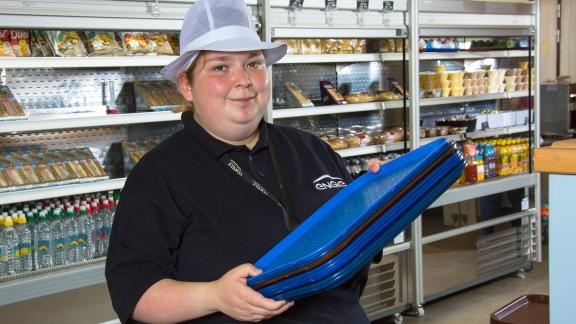Diversifying GOSH’s apprenticeships programme

GOSH recognised apprenticeships as a priority in its education and workforce strategies. They also identified the need to engage and work with local populations and communities to raise awareness of apprenticeships as a career pathway and change some of the outdated perceptions of apprenticeships.
Key benefits and outcomes
- Working with local borough partners GOSH was able to open apprenticeships and career opportunities to residents across Camden, Islington, borough partners and local employability programs.
- GOSH has expanded the apprenticeship programmes’ online presence to attract young people into NHS careers, offering over 10 entry roles with no prior experience necessary.
- Increased staff retention and the diversity of the GOSH workforce through apprenticeships.
- GOSH apprenticeships have achieved the support of the wider organisation. Clear career pathways using apprenticeships have been developed through a range of clinical and non-clinical careers. This enables GOSH to grow its own nurses, healthcare scientists, allied healthcare professionals (AHP) and leaders for the future, whilst utilising the apprenticeship levy and helping grow a talented workforce.
- Apprentices are supported by a learning academy and expert education team.
- GOSH and their apprentices have won nine national awards to date. This has helped with raising awareness and support for apprenticeships locally and nationally.
- GOSH supports a range of national apprenticeship projects in partnership with Health Education England (HEE), the Department of Education (DfE) and the Apprenticeship Ambassadors Network to help support the growth of apprenticeships.
- GOSH also supports other employers and trusts to launch their apprenticeship programmes and share best practice.
What the organisation faced
During the first wave of the COVID-19 pandemic in early 2020, GOSH identified the opportunity to support, develop and diversify its workforce through apprenticeship routes, and provide opportunities to underrepresented groups in the local area. They devised a strategy which focused on expanding and promoting their apprenticeship programme, as well as developing existing staff and encouraging them to consider apprenticeship routes as part of their career progression. This aligned with the hospitals five year Above and Beyond Strategy and the People Strategy. Both these strategies goal is to make GOSH a great place to work and a centre of excellence for learning in the NHS.
What the organisation did
The GOSH apprenticeships team has worked closely with the GOSH Learning Academy (GLA), which played a vital role in growing GOSH apprenticeships across clinical and non-clinical programmes.
Following the award of a charity grant from the GOSH children’s charity, the GLA was able to support over 100 clinical apprentices from a range of careers. This charity grant has allowed GOSH to demonstrate the effectiveness of apprenticeships as a way of developing staff, utilising the unique talents of staff, and increasing retention across the workforce. Working in collaboration with providers, such as BPP University and Dynamic Training the GLA and GOSH apprenticeship teams have created an opportunity for all staff to develop their careers and fulfil their potential.
Apprenticeship opportunities are promoted internally first, to encourage existing staff to consider as part of their personal development. GOSH developed the Above and Beyond Strategy (2020-2025) which commits to investing more in wellbeing, education and development of staff, and are now supporting other organisations with the development of similar strategies. As part of the strategy implementation, they reinvested apprenticeship incentive payments in provisions such as personal laptops to help address digital poverty encountered during COVID-19.
To showcase accessibility in GOSH careers, the team worked in partnership with Camden and Islington local authorities to advertise vacancies and promote apprenticeship opportunities to underrepresented groups. They ensured vacancies, such as the healthcare support worker apprenticeship, were advertised locally two weeks before being advertised on larger employment websites. They also targeted specific questions in the application process to identify applicants in the local area and provided feedback to local authorities on how many residents were recruited into apprenticeship posts.
GOSH utilised the benefits of agile working by increasing their attendance at online meetings and events, engaging with educational networks such as HEE and local colleges, schools and UCAS. By maximising their presence regionally and nationally they helped raise the profile of GOSH apprenticeships and apprenticeships, as an important and accessible pathway into NHS careers.
GOSH broadened its engagement activities by providing career talks in schools to better inform school leavers on career options, increasing its online presence through social media, and creating a YouTube channel for apprenticeships to share videos as well as new internet pages.
Overcoming obstacles
GOSH experienced challenges communicating apprenticeships locally, specifically engagement with schools. By engaging with teachers and school students through in school talks and the creation of educational resources these challenges have been eased, and there is now a wider understanding of the GOSH apprenticeships programme.
GOSH is focused on creating a workforce that is more representative of the local population. They have expanded community engagement by tackling misconceptions about accessing GOSH careers. Certain groups have traditionally felt underqualified and therefore excluded from applying for jobs at GOSH, which is perceived as a highly specialised hospital.
The apprenticeships programme has been met with some resistance in some areas, especially in relation to the development of clinical apprenticeships. The concerns were over the educational requirements and capacity to facilitate. Release time for apprentices has also been a challenge, strained further by the pressures of COVID-19 on clinical teams.
Amid these challenging areas the team have worked hard to establish better communication and change some of the negative perceptions of apprenticeships. They have addressed the use of terminology by renaming off the job learning to on the job learning, to help communicate the benefits of apprentice work experience and the potential development opportunities apprenticeships provide to wider teams. As an apprentice learns predominantly on the job, many teams have seen AHP and nursing apprentices achieve accelerated learning in practice. As they already have a range of clinical background knowledge that might not be seen in students following a traditional academic route.
Maths and English GCSE qualification barriers have proved to be challenging when making apprenticeships more accessible for external candidates, as well as internal staff looking for progression opportunities. GOSH created a free standalone Maths and English programme with the support of a local college, where qualifications can be completed between six weeks and eight months. Encouraging apprenticeship applicants to engage with the programme ensures they can gain access to NHS careers and further development opportunities, removing barriers to progression.
Results and positive impact
- GOSH has over 35 apprenticeship courses around 220 apprentices, over 50 per cent of which are from a black, Asian and minority ethnic (BAME) background.
- By using better workforce data, GOSH has identified that:
- there is a 95 per cent retention of healthcare support worker Level 2 apprentices at two years, 30 per cent of which have gone on to nursing degree pathways
- 68 per cent of GOSH apprentices fall into the 24+ age range, showing that apprenticeships are for all ages
- apprentices now make up over four per cent of the GOSH workforce
- data is key to monitor and demonstrate impact, growth and return on investment.
- Since 2020 GOSH has won six awards, including the Apprenticeship Diversity Award at the 2022 Annual Apprenticeship Conference (AAC) Apprenticeship Awards. They have been promoting NHS roles and apprenticeships at a mixture of events including the Apprenticeships Conference 2022 and the NHS Workforce Conference, where they presented their apprenticeships journey to national leaders in the
Future plans
GOSH plan to use apprenticeships to create pathways for as many NHS careers as possible. They are looking to share knowledge and expertise to co-deliver apprenticeship programmes with other organisations.
As part of their plans to expand their apprenticeships programme GOSH will be introducing new courses in estates and facilities, leadership and management, science, IT and sustainability. They are also looking at developing the GOSH play specialist apprenticeship in partnership with Leeds University. As part of the GOSH Play team, play specialists are key to delivering supportive patient and family care, helping children to feel comfortable and relaxed while working with families to prepare them for life-saving treatment and surgery. This program has now launched, and the second cohort began in September 2022. The GOSH education team plan to co-deliver more apprenticeship programs in the near future supported by experts in specialist areas.
Takeaway tips
- Look at moulding your organisation’s talent by incentivising apprenticeships. Evaluate other recruitment areas and look for opportunities to reinvest in apprenticeships.
- Ensure there are substantive posts available for when the apprenticeships are completed to retain the future workforce you invested in.
- Improve your internal statistics and workforce data. Utilise data to look at how you can make apprenticeships drive diverse recruitment and engagement with job roles. Without data, you have no basis to look at progress, results, and impact.
- Create a clear and focussed governance strategy for apprenticeships. Look at hard to recruit areas, attend and host job fairs, reach out to the local population, and increase engagement activity.
- Work with your apprenticeship provider partners and have a clear recruitment strategy which includes advertising on a wider scale and support with shortlisting and interviewing, saving time and resource for your NHS teams.
- Encourage work experience opportunities to allow individuals to see what is available. Provide clear and accessible information about apprenticeships to improve inclusion, as entry requirements for NHS roles are not always clear and the number of roles can be overwhelming for potential applicants. The NHS has a large variety of roles/specialities that need to be fully understood by interested candidates.
- Recognise and celebrate your apprentices. Promote apprenticeships at all levels and engage with as many awards events as possible. Look at creating internal activities, such as engagement with the Skills for Health, Learning at Work week and creating resources and content which spotlight apprentices and highlight success stories, such as a day in the life of an apprentice.
- Get your apprentices to share their stories through case studies and videos. Many apprentices have had life changing stories to tell, apprentices themselves are the best advertisement for apprenticeships!
Further information
- More information on GOSH’s initiatives can be found on the GOSH apprenticeships web page.
- Other useful links include the UCAS apprenticeships guidance which highlights the life of Shevy, a GOSH apprentice nurse.
- The GOSH Youtube channel, which showcases videos on GOSH apprenticeships and some short videos that cover the employers’ view.
- GOSH Apprenticeship Jobs board.
For further information please contact GOSH apprenticeships team at GOSHApprenticeships@gosh.nhs.uk.



